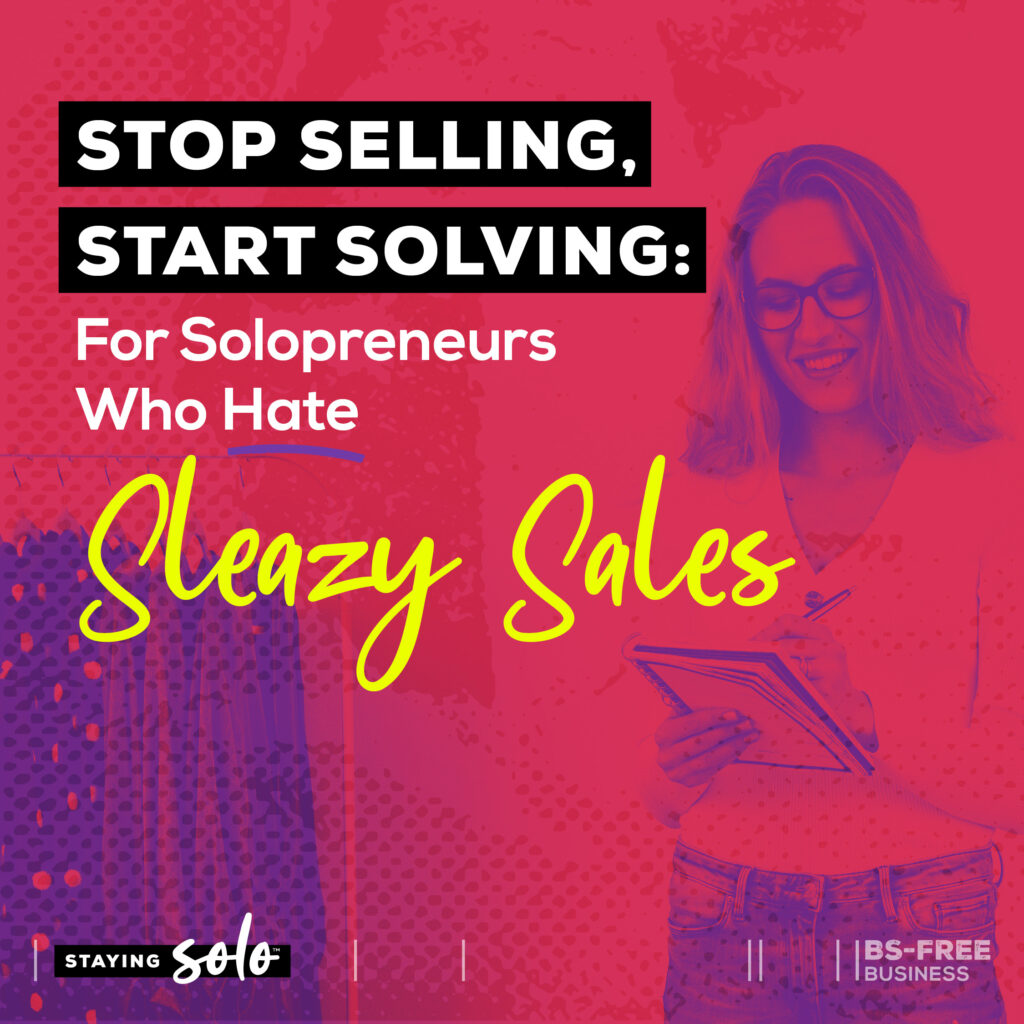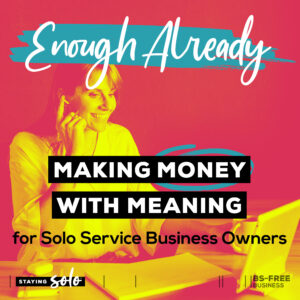
Search the site:
Stop Selling, Start Solving: For Solopreneurs Who Hate Sleazy Sales
Sales can feel like a dirty word for most solo service business owners. You didn’t start your business to become a salesperson, right?
But then the advice rolls in…”Always be closing!” “Overcome objections!” “Push for the deal!”
It feels slimy. But here’s the thing: sales don’t have to feel that way. In fact, what if I told you the secret to better sales isn’t about selling at all?
The real magic happens when you stop trying to sell and focus on solving problems. In today’s episode, I will show you how to shift from selling to solving—because, trust me, once you make that switch, sales start to feel a lot easier and way more authentic.
You probably didn’t start your business because you love sales.
You’re a service provider, problem-solver, creative, or consultant—you’re here to help people with the work you love, not to close deals daily.
But here’s the truth—whether you like it or not, sales is part of your business. Without sales, there are no clients, and without clients… there’s no business.
Selling can feel downright icky, especially when you’re bombarded with conventional sales advice like “close the deal,” “overcome objections,” or “always be closing.” These tactics often feel pushy, inauthentic, and completely out of sync with how you want to run your business.
Selling doesn’t have to feel like that. You don’t need to “sell” at all. What if you could solve problems
Because at the end of the day, that’s what good sales is—helping people with a solution they actually need.
So today, we’ll dig into how to stop selling and start solving—because if the thought of sleazy sales makes you burn down your business, you’ll love this episode.
Myth: Sales Is About Convincing People to Buy
One of the biggest misconceptions about sales is that it’s about convincing people to buy.
That approach to sales is outdated, and honestly, it doesn’t even work in today’s market—especially for service providers. When you try to force a sale, you feel uncomfortable, and the person on the other side feels it, too. It’s inauthentic, and it creates awkward pressure that nobody wants.
No wonder you kind of hate it! Who wants to feel like they’re pushing or pressuring a potential client?
Here’s where the shift comes in: instead of thinking of sales as ‘convincing,’ think of it as helping.
Your job isn’t to sell people something they don’t need but to help them solve a problem. Approaching it from that perspective feels less like selling and more like serving.
Shifting the Focus from Selling to Solving
How do we shift from selling to solving? It starts with understanding what your clients need—and here’s a hint: it’s not just your service or your deliverable.
It’s the outcome. It’s the solution to their problem.
Here’s an example: Let’s say you’re a copywriter. Your clients don’t just need ‘copy’—they need copy that drives more leads, boosts conversions, or helps them connect with their audience. If you focus on the deliverable, you’re selling. If you focus on the outcome—what your service will do for them—you’re solving.
This means that when you have those initial conversations with potential clients, you’re not ‘pitching’ your services. You’re asking questions, examining their challenges, and then offering your expertise to solve them.
Trust me; people can feel the difference. It shows when you’re genuinely interested in helping them solve a problem. And that’s when the magic happens—when sales stop feeling like sales and start feeling like a conversation.
Aligning Your Sales Process with Your Values
One of the reasons so many solo service business owners need help with sales is that it needs to be aligned with their values. You want to be honest, authentic, and transparent—but how sales are taught (especially by celebrity entrepreneurs) can make you feel like you’re being pushy or manipulative.
You can sell in a way that aligns with your values—that’s the only way you should sell.
It can be as simple as:
- Focusing on building relationships.
- Being transparent about what you offer.
- Having clear and consistent pricing.
- Not promising on things you can’t deliver.
- Ensuring the client feels empowered, not pressured.
- Respecting the client’s timeline and decision-making process.
It’s always better to lose a sale than to take on a client who will be a nightmare because they weren’t the right fit. When you operate from a place of honesty and integrity, you’ll build trust, which is priceless.
Objections Aren’t Obstacles: Why You Don’t Need to “Handle” Anything
One of the biggest challenges in sales is handling objections—or at least, that’s what typical sales advice would have you believe.
You’ve likely been taught to treat objections like obstacles to overcome, things you need to cleverly “handle” so you can close the deal. But let me be clear: I hate that narrative.
Why? It feels manipulative like you’re trying to trick people into buying something they’re hesitant about.
The concept of “handling objections” can make it seem like the goal is to outsmart the client rather than truly listen to their concerns. It creates the idea that objections are problems to solve in your favour when they’re just the client expressing valid concerns or asking essential questions.
Objections aren’t something to fear or dodge—they’re an opportunity. When potential clients voice concerns, they give you valuable insight into what they need or what’s holding them back.
It’s not a test of how clever or convincing you are; it’s a moment to connect with them, understand their perspective, and determine if your offer is the right fit.
For instance, if someone says, “That’s too expensive,” traditional advice would have you jump into convincing them why the price is worth it.
But instead of pushing back, why not ask *why* they feel that way? Is it because they need to see the value of what you’re offering fully? Or their budget really can’t support the cost right now.
These are important factors, and understanding them lets you tailor your response. You could offer a more suitable solution or refer them to someone who better fits their budget.
If you’re coming from a place of solving problems, there’s no need to “handle” anything. You’re not here to trick or convince anyone. You’re here to understand, provide clarity, and help them make the best decision for themselves.
If your services fit, great. If not, that’s okay too.
Sales should never feel like a battle to overcome objections—it should feel like a conversation in which both you and the client decide if it’s the right match.
So forget about “handling” objections like they’re something to outwit. Instead, treat them as part of the dialogue—a way to dig deeper and ensure that your solution meets the client’s needs.
It’s less about “yes” and more about getting the right fit.
Practical Strategies to Start Solving
Now, let’s discuss how you can implement this. Here are four practical strategies for shifting from selling to solving.
Lead with Questions
The easiest way to stop feeling salesy is to stop talking about yourself and your services and start asking questions. Ask potential clients what’s happening for them, their biggest challenges, and what they’re struggling to solve. This will flip the script and show that you’re genuinely interested in helping them.
Speak in Outcomes, Not Deliverables
Clients care about the process less than they care about the results. Instead of saying, ‘I’ll write five pages of copy,’ say, ‘I’ll help you create copy that converts more leads into clients.’ Speak directly to the results they’ll get from working with you.
Customize Your Approach
No two clients are the same, so why would your sales conversations be the same? Tailor your service offerings to the specific needs of each client. Show them that you understand their unique situation and have thought carefully about how to help them solve their problem.
Use Storytelling
People relate to stories, so instead of rattling off a list of features or benefits, share stories of past clients you’ve helped—without overpromising. This builds a connection and allows potential clients to see how you can help them.
When You Solve Problems, Sales Take Care of Themselves
To wrap up, remember: You’re not just selling a service but solving a problem. When you approach sales from that mindset, everything changes.
You stop feeling like you have to convince anyone of anything and instead offer solutions to the people who need them.
If you’re ready to transform your sales conversations from awkward to authentic, start by shifting your focus to solving, not selling. You’ll build stronger client relationships, feel better about the process, and, most importantly, align with your values.

I’m Maggie Patterson (she/her), and services businesses are my business.
I have 20+ years of experience with client services, am a consultant for agency owners, creatives, and consultants, and vocal advocate for humane business practices rooted in empathy, respect, and trust.
Read or Listen to the Latest
Check Out These Posts
For Solo Business Owners

Growing a solo service business is tough.
It’s even harder when you’re bombarded with BS advice that steers you away from your values and why you started your business in the first place.
This is the podcast for solo creatives and consultants who want to remain as a team of one and have zero interest in the hustle and grind of typical business teachings.
Subscribe now and never miss an episode.
For Micro Agency Owners
Most podcasts for agency owners obsess over revenue growth as the ultimate success metric.

But here’s the truth: not everyone wants to make millions. Your goal might be to build a sustainable business that lets you have a life and doesn’t run you into the ground.
Join me as I spill my shameless confessions and share everything I’ve learned about building a micro agency that skips the BS of tired and typical agency teachings.
Follow Now on All Major Podcast Platforms








